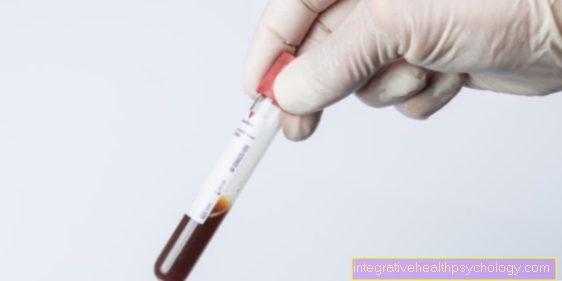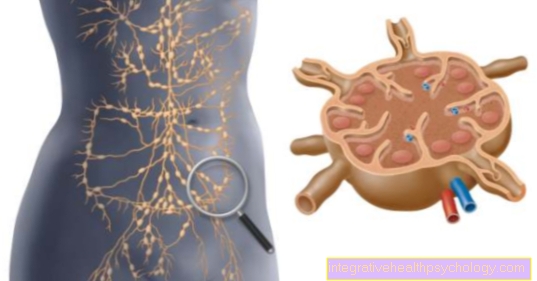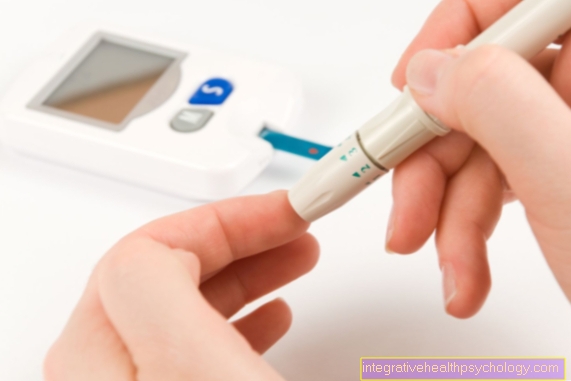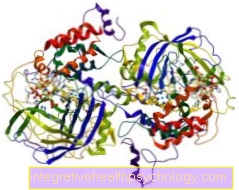Electrolytes in the blood
What are the normal values?
Electrolytes in the blood have various functions and tasks in the body's circulation and metabolism. For these tasks to work properly, the concentration of the electrolytes must be within a certain range. The standard values of the electrolytes are given in the concentration millimoles per liter. A mole is the international base unit of the amount of substance.

For sodium the norm values are between 135 and 145 mmol / L. The Potassium normal values lie between 3.8 and 5.2 mmol / L. The norms for the Total calcium should be in the range of 2.2-2.65 mmol / L located that ionized calcium (that is, the proportion of calcium that is free in the blood and not bound to protein), should be about half of the total calcium: 1.15-1.35mmol / L. The standard values for chloride lie between 96 and 110 mmol / L, For phosphate between 0.84 and 1.45 mmol / L. The normal values of the various electrolytes are the same for men and women.
What are the functions of electrolytes in the blood?
Potassium is mostly present in the cells and plays an important role in the regulation of the electrical excitability of these cells, for example the heart muscle cells. If the potassium concentration shifts, cardiac arrhythmias can be the result.
Read more about here Potassium in the blood
In addition to potassium, calcium and chloride are also involved in the excitability of cells. Calcium regulates the excitability of muscle cells and plays a major role in building bones and regulating blood clotting.
Read more about here Calcium in the blood
Chloride is usually present in the blood together with sodium as table salt. Chloride influences the excitability of nerve cells; if there is a shift in the acid-base balance, the chloride concentration is usually also shifted.
Read more about here Chloride in the blood
Sodium is the most important positively charged cation (ion) in blood. The sodium level is the marker for the body's water balance and is determined by thirst (Absorption of water) and urine production (Loss of water) regulated. Disturbances in the water balance and thus in the sodium concentration are primarily noticeable through neurological symptoms such as confusion and disorientation.
Read more about here Sodium in the blood
Together with calcium, phosphate is used to build bones, is involved in the acid-base balance and in many other metabolic processes, and is a component of DNA, among other things.
Read more about blood tasks here
What to do if the values are too low
Too low electrolytes in the blood must be compensated in order to avoid or remedy health consequences. If the sodium level in the blood is too low, however, it must be noted that compensating too quickly can lead to dangerous consequences like pontine myelinolysis (Dissolution of the nerve fiber sheaths in the area of the bridge, in the brain stem) and the resulting neurological failures. A sodium level that is too low should therefore slowly with infusions be treated. If the sodium level is too low for a very short period of time, it can be compensated more quickly than if a chronically too low sodium level has to be treated.
Easily low potassium levels can be caused by a high potassium diet (e.g. Bananas) or by means of Effervescent potassium chloride tablets be balanced. Significantly too low potassium levels require one intravenous supply of potassium.
Low calcium levels can cause Tetany (Muscle cramps due to calcium deficiency, e.g. with hyperventilation) through the intravenous administration of calcium be balanced to quickly end the tetany. To compensate for a chronic calcium deficiency Calcium combined with vitamin D. given as a chewable tablet to prevent breakdown of bone substance.
A slight phosphate deficiency is also associated with high phosphate diet (e.g. milk) and the gift of Vitamin D chewable tablets treated, a more severe deficiency can only be treated by intravenous administration of phosphate.
What to do if the values are too high
Excessive levels of electrolytes in the blood should also be balanced out in order to avoid or remedy health consequences. Excessive sodium levels are caused by the intravenous administration of glucose and fluid solution or by intravenous administration of Glucose and diuretics (increase urine production) treated. When balancing, it should be noted that lowering the sodium level too quickly leads to a Brain edema can lead.
A potassium level that is too high (Hyperkalemia) can be used in an emergency by the intravenous administration of glucose and insulin be lowered, as a result, more potassium is absorbed into the cells and removed from the butt. The administration of sodium bicarbonate increases the pH of the blood. Increased blood pH also causes more potassium to be absorbed into cells. Additionally, potassium can be supplied by a means Diuretics increased urine production or by dialysis removed from the blood.
Read more on the subject here Hyperkalemia
Too high a calcium level is means drug-induced increased urine production quasi out of the body "washed out". If the high calcium level is caused by a bone tumor or a bone metastasis, the administration of certain drugs (Bisphosphonates) inhibit the activity of those cells that are responsible for bone loss and thus lower the calcium level.





























